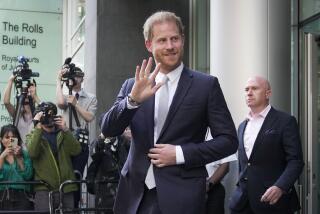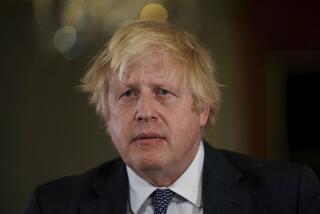Inquiry Clears Blair of Charges on Iraq
- Share via
LONDON — A senior judge Wednesday exonerated Prime Minister Tony Blair and his government of charges that they knowingly used false intelligence to make the case for war in Iraq. But the judge castigated another British institution, the BBC, for airing an “unfounded” allegation that the Blair government had “sexed up” its case for war.
The chairman of the BBC, Gavyn Davies, resigned within hours of Lord Brian Hutton’s report. Davies’ head may be only the first to roll in a cathartic moment for the publicly chartered but fiercely independent news organization that permeates British life.
The 328-page report by Hutton, who was appointed by Blair, came after a series of public hearings following the July 17 suicide of government biological weapons scientist David Kelly.
Kelly, a former United Nations arms inspector in Iraq, slashed his left wrist and bled to death after government officials released his name as the source of reports by a BBC journalist that accused the Blair government of exaggerating evidence about Iraq’s weapons. Kelly’s family and friends said the respected scientist had become despondent after the disclosure.
The bottom line of Hutton’s report was that the Blair government had acted honorably, had been falsely accused, and the BBC was the most to blame in the events before Kelly’s death.
Hutton stopped short of directly blaming any party for Kelly’s suicide, saying no one involved could have reasonably anticipated it. Moreover, Hutton did not attempt to answer the larger issue of whether the government’s intelligence for going to war was faulty.
The long-awaited report had been expected to deal at least a minor blow to the sagging political fortunes of the prime minister, who has been accused by critics of overselling the Iraq war and -- because no weapons of mass destruction have been found -- needlessly engaging Britain in a conflict from which there is no easy exit.
While the deeply unpopular war was expected to continue to exact a political cost for Blair, the report marked the second time in two days in which the prime minister avoided a major setback. On Tuesday, he won a 316-311 vote in Parliament on a bill to increase university tuition, fending off a revolt within his own Labor Party.
Blair and his former communications director, Alastair Campbell, were on the offensive Wednesday following the report’s release, saying that the government had been totally vindicated and calling for public apologies from their accusers.
“The allegation that I or anyone else lied to this house or deliberately misled the country ... is itself the real lie,” Blair said in Parliament. “I simply ask that those who have made it and those who have repeated it over all these months now withdraw it, fully, openly, and clearly.”
It was not clear whether he was speaking of his political opponents in the Conservative Party or the BBC. Conservative leader Michael Howard continued to suggest in the House of Commons that Blair may have unduly massaged intelligence findings, and issued no retraction of past criticisms.
Greg Dyke, director-general of the BBC, issued a statement acknowledging that parts of its reporting about a September 2002 government dossier had been incorrect.
“The BBC does accept certain key allegations reported by Andrew Gilligan on the ‘Today’ program on May 29 last year were wrong and we apologize for them,” Dyke said.
“However we would point out again that at no stage in the last eight months have we accused the prime minister of lying, and we have said this publicly on several occasions.”
The censure of the BBC could affect more than just its personnel. Blair mentioned in Parliament that the corporation’s special charter, dating from 1922, comes up for renewal in 2006. Some took that as a veiled threat that the BBC’s special legal status could be altered and it might have to submit to independent regulation as do other media outlets, rather than be controlled by its board of governors.
In his news reports, Gilligan, a defense correspondent who had met with Kelly on May 22 at a London hotel and used him as a principal source, said the government had “sexed up” its dossier to the public to make the case that Saddam Hussein’s regime posed an imminent threat.
Gilligan’s most damning accusation was that the government had put a claim in the dossier that its intelligence experts knew was probably untrue: that Hussein’s regime could deploy weapons of mass destruction in just 45 minutes.
Hutton said Gilligan’s notes from his meeting with Kelly, written into his palm computer, did not back up the accusation.
“I have considerable doubts as to how reliable Andrew Gilligan’s evidence is concerning what Dr. Kelly said to him,” Hutton said. He also criticized the BBC editorial system for allowing Gilligan to go on the air at 6:07 a.m. from his home in an unscripted question-and-answer format without the news organization knowing beforehand what was in his report and without first giving the government a chance to refute the charges.
Some BBC journalists were aghast at the judge’s conclusions, while along Fleet Street, editors of other publications said they thought the 73-year-old jurist did not understand how journalism worked and had simply come to the defense of the government in every instance.
The Hutton report was “a disaster for us, really, something that will give the enemies of the BBC a spring in their step,” said one veteran BBC journalist, who asked not to be named. “We’re going to have to take endless crowing from second-rate government ministers and newspapers that love to kick the BBC.”
Michael White, political editor of the Guardian newspaper told the BBC: “Lord Hutton has been very severe on the BBC, rightly so in many respects in my view. But he has been overly generous to the government machine and some individuals within it.”
The National Union of Journalists branded Hutton’s report “selective, grossly one-sided and a serious threat to the future of investigative journalism.”
In his report, Hutton said that Gilligan’s report on the government’s dossier contained “very grave allegations” impugning the integrity of the government. While upholding the media’s right to conduct investigative journalism, he said that any journalist must be held to a standard of truthfulness.
“I consider that the editorial system which the BBC permitted was defective in that Mr. Gilligan was allowed to broadcast his report without editors having seen a script of what he was going to say and having considered whether it should be approved.”
He said BBC management was also derelict in not investigating Gilligan’s notes in detail for nearly a month after the government complained, and that when it failed to do so, the BBC board of governors should have stepped in -- instead of speaking primarily to defend the independence of the BBC.
While not looking into the larger issues about the government’s intelligence efforts, Hutton did review the fundamental accusation that Blair and his aides in Downing Street may have leaned on Britain’s three intelligence agencies to produce findings that supported their contention that Hussein posed an immediate threat.
Hutton noted that the country’s Joint Intelligence Committee had agreed with the final draft of the dossier. Although it accepted some wording changes suggested by Downing Street, the committee maintained standards overall and had not been forced to rubber-stamp any false or inaccurate statements, the judge concluded.
Hutton conceded, however, that Blair’s desire for the strongest dossier possible against Hussein’s regime “may have subconsciously influenced” the intelligence chiefs.
The government also was cleared of allegations that Blair’s then-spokesman, Campbell, had intentionally leaked Kelly’s identity as the source of Gilligan’s report to other journalists as a hardball move in its dispute with the BBC.
Hutton accepted Blair’s explanation that the government feared that Kelly’s name would inevitably surface anyway and that the government confirmed it when asked because it did not want to be accused of a cover-up.
After his name was released, Kelly was called before a parliamentary committee and involved in a public dispute about what he had or had not said. He was also forced to concede that he had violated government guidelines by having unauthorized meetings and conversations with reporters. Feeling he was no longer trusted probably led to a loss of self-esteem and a feeling that his life’s work had been undermined, Hutton said, citing a psychiatrist’s testimony.
Davies, the first BBC chairman ever to resign over the organization’s reporting, expressed doubts about some of Hutton’s findings, saying evidence that contradicted some of his conclusions seemed to have been disregarded.
But, he said, “I have been brought up to believe that you cannot choose your own referee, and that the referee’s decision is final. There is an honorable tradition in British public life that those charged with authority at the top of an organization should accept responsibility for what happens in that organization.”
For the time being, Gilligan has not been sanctioned, and continues to work on radio documentaries. But he has kept a low profile.
Lord Charles Powell, a onetime aide to Margaret Thatcher, said that even though the government was exonerated in the Hutton inquiry, there was still a lesson for it to draw.
“I think what we’ve learned from this is that, as Mrs. Thatcher used to say, secret intelligence is best kept secret. It is there to draw judgments, and should not be used to try to make political points.”
Special correspondent William Wallace and Janet Stobart of The Times’ London Bureau contributed to this report.
More to Read
Sign up for Essential California
The most important California stories and recommendations in your inbox every morning.
You may occasionally receive promotional content from the Los Angeles Times.










